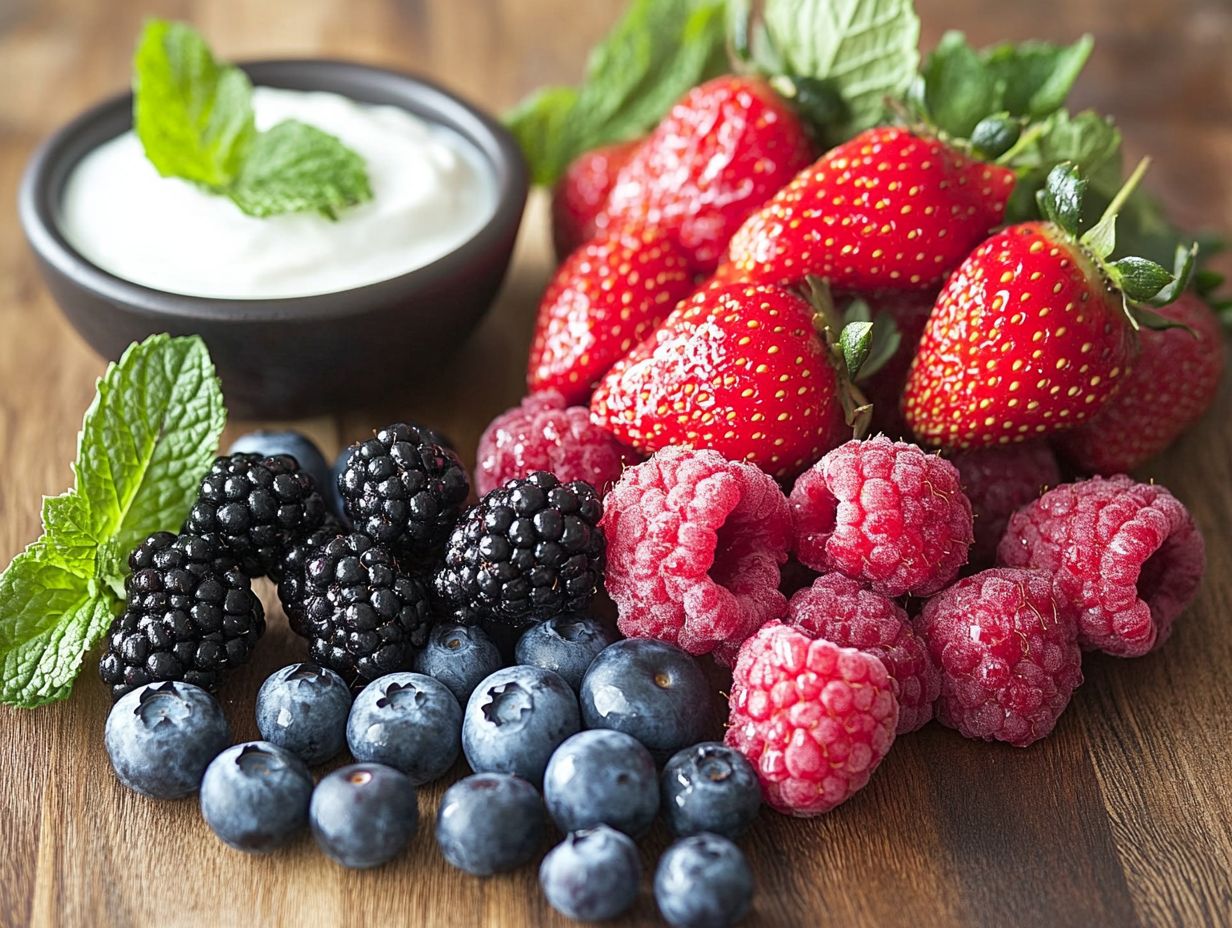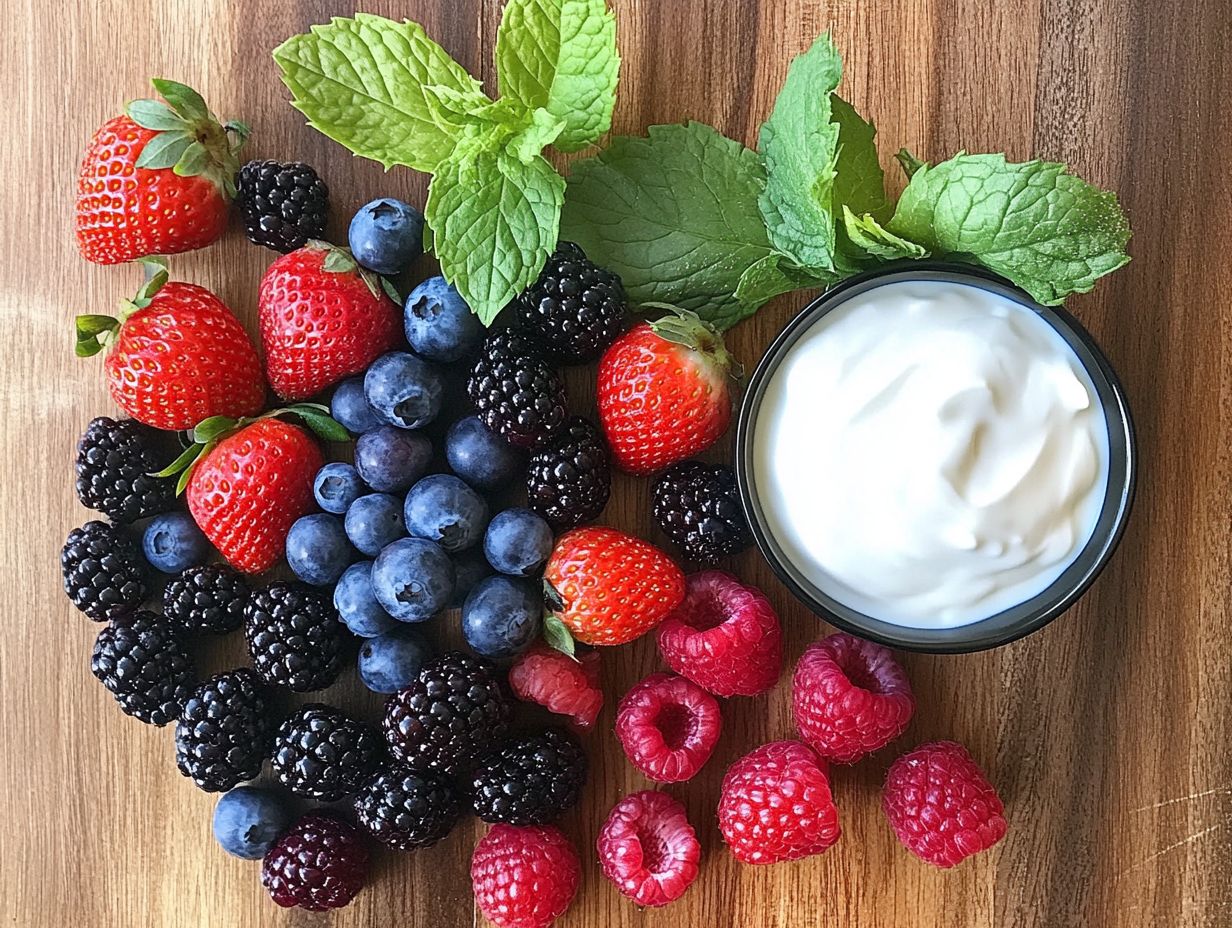The Health Benefits of Eating Berries
Berries are not merely a delightful treat; they are nutritional powerhouses brimming with vitamins, minerals, and antioxidants. Let s dive into how these tiny fruits can transform your health!
Dive into the world of berries and uncover their remarkable health benefits, along with how they can elevate your overall well-being. From enhancing your immune system and promoting heart health to supporting cognitive function and reducing inflammation, the advantages of incorporating berries into your diet are truly extensive.
We’ll also explore potential risks and offer you creative ways to savor these vibrant fruits. Discover why berries absolutely deserve a prime spot on your table!
Contents
- Key Takeaways:
- What Are Berries?
- What Are The Nutritional Benefits Of Berries?
- What Vitamins And Minerals Are Found In Berries?
- What Are The Health Benefits Of Eating Berries?
- 3. Enhances Brain Function
- 4. Reduces Inflammation
- Are There Any Potential Risks of Eating Berries?
- 2. Pesticide Exposure
- 3. Interactions With Medications
- How To Incorporate Berries Into Your Diet?
- The Benefits of Berries
- 4. Berries In Recipes
- Frequently Asked Questions
Key Takeaways:

- Berries are a nutritious fruit that contains essential vitamins and minerals to maintain a healthy diet.
- Eating berries can boost your immune system, improve heart health, and enhance brain function due to their anti-inflammatory properties.
- When incorporating berries into your diet, be mindful of potential risks such as allergic reactions, pesticide exposure, and interactions with medications.
Don t miss out on making these nutritional powerhouses a staple in your diet!
What Are Berries?
Berries are those delightful, small, juicy fruits that come in a spectrum of varieties, from strawberries and blueberries to blackberries, raspberries, and cranberries. Not only are these berries delicious, but they also pack a punch when it comes to essential nutrients and antioxidants, making them a superb addition to your healthy diet.
You can enjoy berries fresh or frozen, providing you with versatile options for consumption and preparation. Their cultivation thrives in diverse climates, resulting in a rich array of flavors and colors that captivate both health-conscious individuals and culinary aficionados alike.
What Are The Nutritional Benefits Of Berries?
Berries offer a remarkable array of nutritional benefits that significantly enhance your overall health, making them an essential component of a balanced diet.
Packed with vitamin C, potassium, magnesium, and dietary fiber, they play a crucial role in supporting your immune function, cardiovascular health, and digestive processes.
The antioxidants in berries such as anthocyanins, ellagic acid, and resveratrol further amplify their health-promoting qualities, positioning them as powerful allies in the battle against chronic diseases.
Indulging in these vibrant fruits is not just a treat; it s a proactive step toward a healthier you.
What Vitamins And Minerals Are Found In Berries?
Berries are rich in essential vitamins and minerals, including vitamin C, potassium, and magnesium, all while boasting a hearty dose of dietary fiber. These nutrients work in harmony to support a myriad of bodily functions, from boosting your immune system to maintaining healthy blood pressure and enhancing gut health.
Take vitamin C, for example. It s not just a powerful antioxidant; it s also critical for collagen synthesis, playing a pivotal role in keeping your skin healthy and aiding in wound healing. For adults, the recommended daily intake hovers around 75-90 mg.
Then there’s potassium, which is essential for proper muscle function and fluid regulation within your body. You should aim for about 2,500-3,000 mg per day to reap its benefits.
Don t overlook magnesium, either; it supports over 300 biochemical reactions and is critical for energy production, with a daily value ranging from 310-420 mg depending on your age and sex.
The nutrients found in berries have been associated with a reduced risk of chronic diseases, such as cardiovascular ailments and diabetes, underscoring their vital role in a balanced and healthy diet. Enjoying these vibrant fruits is not just a treat for your taste buds; it s an investment in your well-being.
How Do Berries Contribute To A Healthy Diet?
Incorporating berries into your healthy diet can significantly elevate your overall well-being. These little gems are low in calories yet packed with essential nutrients and dietary fiber. Enjoying berries regularly helps you manage your weight while delighting your taste buds! This makes them an ideal choice for anyone looking to maintain or enhance their dietary habits.
These vibrant and delicious fruits can seamlessly fit into a variety of meal plans, whether you follow a low-carb, vegan, or Mediterranean diet. When you add berries to smoothies, not only do you boost their nutritional value, but you also add a delightful burst of color and flavor that makes them even more enticing.
As a tasty snack, berries can be savored on their own or paired with yogurt and granola for a satisfying treat. You can also explore recipes like berry-infused oatmeal or a refreshing summer salad with berry vinaigrette, further showcasing the versatility of these superfoods while aligning with your health goals.
What Are The Health Benefits Of Eating Berries?
Indulging in berries presents a plethora of health benefits that go beyond basic nutrition. They help reduce inflammation, lower cholesterol levels, and promote heart health.
Regularly eating berries can lower the risk of chronic diseases like type 2 diabetes and heart disease. Their protective effects against cognitive decline also make them a critical component of a health-conscious lifestyle.
1. Boosts Immune System

Berries, especially those packed with vitamin C and antioxidants, are your allies in boosting the immune system, helping your body fend off infections and illnesses with remarkable efficiency. The phytonutrients and vitamins found in these vibrant fruits enhance immune function by improving cellular signaling and reducing oxidative stress throughout your body.
Research has shown that certain varieties of berries, such as blueberries and strawberries, are abundant in anthocyanins and other flavonoids that deliver powerful antioxidant benefits. These antioxidants are vital for neutralizing free radicals those pesky unstable molecules that can wreak havoc, causing cellular damage and inflammation.
By increasing your intake of vitamin C, which is plentiful in raspberries and blackberries, you not only support the production of white blood cells but also promote skin health, effectively creating a barrier against pathogens.
Incorporating a variety of these colorful fruits into your diet can significantly boost your overall immune resilience, providing a delicious and effective strategy for safeguarding against seasonal illnesses and infections.
2. Improves Heart Health
Regularly indulging in berries can significantly enhance your heart health and reduce the risk factors associated with cardiovascular diseases. The antioxidants found in berries, particularly resveratrol, are vital for lowering LDL cholesterol levels and maintaining healthy blood pressure, promoting your overall cardiovascular well-being.
Numerous studies bolster this connection, revealing that when you incorporate a variety of berries into your diet, you may experience noteworthy improvements in your heart health metrics. For instance, research published in the American Journal of Clinical Nutrition showed that participants who frequently consumed blueberries had lower systolic blood pressure and reduced arterial stiffness.
These findings indicate that adding berries to your meals could serve as a straightforward yet effective strategy for managing cholesterol and blood pressure levels. With this evidence in mind, adding berries to your diet could be a game-changer for disease prevention, ultimately paving the way for a healthier life for you.
3. Enhances Brain Function
Berries have been shown to elevate your brain function and may offer protection against cognitive decline as you age. The powerful antioxidants found in these delightful fruits, particularly anthocyanins, are linked to enhanced memory and cognitive performance. This makes them a vital addition to your brain-healthy diet.
Recent studies have illuminated the benefits of regularly indulging in blueberries, strawberries, and blackberries. They reveal notable improvements in various aspects of cognitive function. For instance, research published in the Journal of Agricultural and Food Chemistry found that older adults who included berries in their diets experienced slower rates of cognitive decline compared to their berry-less counterparts.
A study from Harvard University indicated that women who consumed higher amounts of strawberries and blueberries saw a reduced risk of dementia over time. These findings emphasize the importance of incorporating these nutrient-dense fruits into your routine to bolster overall brain health and promote longevity.
4. Reduces Inflammation
Berries are celebrated for their remarkable anti-inflammatory properties, capable of reducing chronic inflammation tied to various health conditions. The phytonutrients and antioxidants found in these little gems, including resveratrol and anthocyanins, actively combat inflammation at the cellular level. This fosters better overall health and lowers your risk of chronic diseases like heart disease and type 2 diabetes.
These vibrant fruits are packed with beneficial compounds like anthocyanins, flavonoids, and ellagic acid. Numerous berry-related studies have shown they inhibit substances in the body that promote inflammation and enzymes. For example, research published in the Journal of Nutrition reveals that incorporating berries into your diet can significantly reduce specific inflammatory markers, such as a marker that indicates inflammation in the body, ultimately contributing to better cardiovascular health.
This not only eases symptoms associated with conditions like arthritis and cardiovascular diseases but also plays a crucial role in chronic disease prevention by diminishing the overall inflammatory burden on your body. Berry consumption is also linked to better cognitive health and may help prevent cognitive decline as you age.
Are There Any Potential Risks of Eating Berries?
While berries are often hailed as a nutritious and delightful addition to your diet, it’s important to know the potential risks that can accompany their consumption. These include concerns about allergic reactions, pesticide exposure, and interactions with specific medications. Be aware that certain individuals may experience allergic reactions to specific types of berries, which can vary from mild symptoms to severe cases that necessitate medical intervention.
Common symptoms associated with berry allergies can include hives, nasal congestion, and gastrointestinal distress. In severe instances, the situation could escalate to anaphylaxis, characterized by difficulty breathing and a rapid pulse. Strawberries, raspberries, and blackberries are among the culprits most frequently triggering these reactions. If you suspect you might have a sensitivity, it s wise to limit your intake and consult a healthcare provider for allergy testing.
Maintaining a detailed food diary could prove invaluable in identifying which berries might be hazardous to you. This enables you to make informed decisions while grocery shopping or dining out. Enjoy the vibrant benefits of berries in your diet, and don t miss out on the amazing advantages they offer!
2. Pesticide Exposure

Pesticide exposure is a valid concern when it comes to consuming non-organic berries, as residues can linger on the fruit. By choosing organic berries or washing them thoroughly before indulging, you can significantly reduce this risk and embrace safer eating habits. This is especially important for strawberries and blueberries, which are often treated with pesticides.
This consideration is crucial given that conventional farming methods often involve a wide array of synthetic pesticides, which can leave harmful residues behind. Organic farming, on the other hand, operates under strict regulations that limit the use of these chemicals, ultimately nurturing a healthier ecosystem.
Such practices benefit you by minimizing exposure to potentially harmful substances. They also enhance biodiversity and improve soil health. By opting for organic, you play a part in promoting environmentally sustainable practices while enjoying berries that are fresher and free from harmful pesticides. This choice leads to better health outcomes and grants you peace of mind. Choosing organic berries means you also enjoy higher levels of antioxidants, which benefit your health.
3. Interactions With Medications
Certain berries have the potential to interact with medications, which could impact their effectiveness or lead to undesirable side effects. It s crucial for you to consult with healthcare professionals before deciding to significantly increase your berry intake. For instance, increasing your intake of berries like grapefruit and cranberries without guidance may lead to unintended interactions.
Particular berries, like grapefruit and blueberries, are known to influence how your body metabolizes certain drugs. For example, the compounds in blueberries can inhibit enzymes in the cytochrome P450 system, which is a system in your body that helps break down medications. This interaction may lead to either enhanced effects or unexpected toxicity. You should be particularly mindful of how these berries can affect blood sugar levels or blood-thinning medications, as well as medications for metabolic syndrome.
Navigating these complexities safely and effectively requires professional guidance, ensuring that your berry consumption enhances your health rather than jeopardizing it. It’s essential to stay informed about potential interactions and how they may impact your insulin levels and overall berry-related health.
How To Incorporate Berries Into Your Diet?
Incorporating berries into your diet is simple and delightful! They offer remarkable versatility, available in fresh, frozen, and even dried forms for your convenience. These berry types ensure that you can enjoy their health benefits all year round.
Whether you’re blending them into smoothies, adding them to desserts, tossing them into salads, or incorporating them into savory dishes, berries can truly elevate the flavor and nutritional value of countless meals. Their high content of potassium and magnesium further contributes to their diverse nutritional advantages.
Don t miss out on the chance to boost your health with these berry benefits!
The Benefits of Berries
1. Fresh Berries
Fresh berries offer a delightful and nutritious way to savor the health benefits of these vibrant fruits, making them an ideal choice for snacking or enhancing various dishes. Their vibrant colors and sweetness enhance any meal, providing you with essential vitamins and antioxidants.
To ensure the best flavor and longevity, it s crucial to select berries that are firm and free from blemishes. For storage, opt for a breathable container in the fridge; moisture can lead to unwanted spoilage. Fresh berries, rich in vitamin C and dietary fiber, can make a nutritious addition to your meals.
These succulent gems can transform your morning routine consider folding them into yogurt or oatmeal for a refreshing breakfast. For a light lunch, toss them into salads with greens, nuts, and a zesty vinaigrette for a delightful crunch. The high fiber content in berries supports managing your diet and aids in maintaining a healthy gut.
Let your creativity shine with desserts by incorporating berries into smoothies or using them as a luscious topping on cakes and tarts, allowing their natural sweetness to take center stage while you enjoy their numerous health benefits. The antioxidants in berries can help reduce LDL cholesterol levels often referred to as ‘bad’ cholesterol which can lead to heart health issues.
2. Frozen Berries
Frozen berries present a convenient and enduring option for reaping the benefits of berries throughout the year, all while retaining their nutritional value. Whether you re whipping up a quick breakfast smoothie or enhancing a dessert, the versatility of frozen berries is simply unparalleled. According to Eric Rimm from the Harvard T.H. Chan School of Public Health, frozen berries are just as nutritious as fresh ones.
These vibrant fruits transform your dishes, elevating everything from yogurt parfaits to oatmeal with delightful flavor and essential vitamins. When you blend them into smoothies, a method that preserves freshness during freezing ensures their nutritional punch matches that of fresh berries.
For those who enjoy baking, adding frozen berries to muffins or cakes brings unexpected bursts of flavor and moisture that can elevate your creations. To maximize the benefits of these frozen gems, remember to store them in airtight containers to ward off freezer burn. Use them directly from the freezer to maintain their ideal texture and taste.
3. Dried Berries
Dried berries offer a convenient and portable snack that allows you to savor the benefits of berries anytime, anywhere. They re a fantastic addition to trail mixes, cereals, or as a delightful topping for yogurt, all while packing in valuable nutrients and antioxidants.
These delightful snacks are packed with flavor and last a long time, making them perfect for your busy lifestyle or outdoor escapades. Their lightweight nature enhances their appeal, as they easily fit into your bag or can be stored effortlessly in your pantry. Including dried berries in your diet supports weight management and provides a convenient source of antioxidants and fiber.
Berries can elevate a variety of dishes; imagine stirring them into your morning oatmeal for an extra punch of sweetness and fiber or blending them into smoothies for a vibrant, nutrient-rich drink. You can even sprinkle them on desserts like cakes or ice cream, adding a burst of sweetness and essential vitamins while satisfying your sweet tooth.
Don’t miss out on these delicious snacks that benefit your health! Which type of berries will you add to your meals today?
4. Berries In Recipes

Berries can be creatively incorporated into a stunning array of recipes, from invigorating smoothies and delightful desserts to unexpectedly savory dishes. Their natural sweetness and vivid colors enhance flavor while providing an abundance of health benefits. This makes them a beloved choice for those who appreciate culinary excellence. The numerous berry-related benefits make them a versatile ingredient in any healthy diet.
Incorporating these exquisite fruits into your meals is easy and opens up a world of culinary creativity. For instance, imagine blending a vibrant mix of strawberries, blueberries, and raspberries into a smoothie that kickstarts your day with a refreshing and nutritious boost. The vitamin C and dietary fiber in these berries support your overall health.
Transform your salads by adding blackberries and cranberries for a delightful burst of flavor and texture. Consider making homemade jams to capture the seasonal essence of berries, allowing you to enjoy their delightful taste all year round. According to a study published in the Washington Post, berries can help reduce urinary tract infections.
As you explore various combinations and culinary techniques like roasting or infusing you’ll uncover unique flavors that can elevate any dish to new heights. Including berries in your recipes can help manage chronic diseases and improve overall berry nutrition.
Frequently Asked Questions
What are the health benefits of eating berries?
Consuming berries can lead to numerous health benefits, including improved cardiovascular health, better cognitive health, and a reduced risk of chronic diseases like type 2 diabetes and heart disease. Their rich content of antioxidants, fiber, and other nutrients supports overall well-being.
Berries are packed with essential vitamins, minerals, and antioxidants that improve overall health. They boost the immune system, promote heart health, and may even help prevent certain types of cancer.
How do berries contribute to a healthy heart?
Berries contain natural compounds found in plants that protect the heart from damage and help lower blood pressure and cholesterol levels. They also have anti-inflammatory properties that can reduce the risk of heart disease.
Can eating berries help with weight loss?
Yes, berries are low in calories and high in fiber, making them a perfect addition to a weight loss diet. They help keep you full for longer and prevent overeating while providing essential nutrients to the body.
Do all types of berries have the same health benefits?
While all berries are nutritious, different types offer unique health benefits. For example, blueberries are known for their anti-aging properties, while strawberries are beneficial for eye health.
How can eating berries improve skin health?
The high levels of antioxidants in berries help fight free radicals in the body, which damage skin cells and cause premature aging. Eating berries can help prevent wrinkles, age spots, and other signs of aging.
Are there any potential risks of eating berries?
For most people, eating berries is safe and highly beneficial. However, individuals with certain allergies or medical conditions may need to avoid specific types of berries. It is always best to consult a healthcare professional before making significant changes to your diet.






